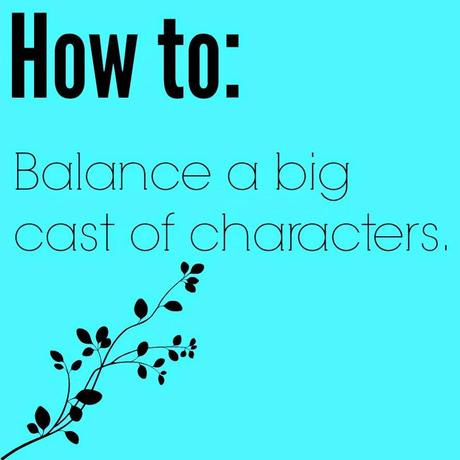 Let me say this: writing a book is no walk in the park. Anyone who says otherwise hasn't done it properly. When it comes to penning a novel, you've got to learn how to balance the fine art of storytelling with the fine art of staying sane. Yes. I said sane. We artists are often solitary folks and, unfortunately, some of us have had dreadful endings. (Edgar Allen Poe, anyone?) But hey, not all of us are like that. I'm very happy with being a writer. It's hard, but it's wonderful. It's challenging, but what's life without a challenge, right? One of the most interesting challenges that I learned to face over the years is balancing a cast of characters and supporting characters in my novels. If you have too many characters, it deprives the reader of getting to know your supporting cast - and character development is one of the key aspects of crafting a good story. If you don't have enough characters, the reader can get bored. So how do you find that perfect balance?
Let me say this: writing a book is no walk in the park. Anyone who says otherwise hasn't done it properly. When it comes to penning a novel, you've got to learn how to balance the fine art of storytelling with the fine art of staying sane. Yes. I said sane. We artists are often solitary folks and, unfortunately, some of us have had dreadful endings. (Edgar Allen Poe, anyone?) But hey, not all of us are like that. I'm very happy with being a writer. It's hard, but it's wonderful. It's challenging, but what's life without a challenge, right? One of the most interesting challenges that I learned to face over the years is balancing a cast of characters and supporting characters in my novels. If you have too many characters, it deprives the reader of getting to know your supporting cast - and character development is one of the key aspects of crafting a good story. If you don't have enough characters, the reader can get bored. So how do you find that perfect balance? Simplicity and strategy!
- Set a limit. I've heard it said that there shouldn't be more than seven to ten supporting characters in a novel. This can be true, but it's not something that's set in stone. Look at Harry Potter. Yeah. Way more than ten characters, and plenty of character development. But the basis of the idea is absolutely correct: don't have too many characters. Find the seven to ten core players of your story and focus on developing them. Everyone else is peripheral.
- Don't get complicated. Like I said before, focus on developing your main players. Show some growth and changes. The best thing that you can do for yourself is to give each character a purpose. Ask yourself: what is this person adding to the story? Knowledge? Comic relief? A valuable nugget of information that will conveniently give our hero the upper hand? Know beforehand, and it will make everything else easier.
- Give them something special. The reader should consistently be reminded of who a character is - and you can do this by giving the character something that makes them unique and memorable. For example: "He had an ugly red scar across his eye." Dramatic? Yes. Weird. Okay, yes. But memorable, right? Later on in the book when you're mentioning that same character, remind your reader who you're talking about by talking about that characteristic: "His scar looked grotesque in the light of the moon." Your reader will think, Ah, yes. That's right. He had a scar. Now I remember who we're talking about... Make it easy.
- Show a change. I mentioned this before, but let's face it: if you want drama and emotion - which is the very essence of writing - you've got to show your reader that your characters have changed somehow. Whether it's getting over a fear of heights or learning to forgive someone dark and sinister from their past, something should shift from the first page to the last. And if you're writing a series, something should change in each book.
- Don't be mean. Okay, listen. I'm a writer, and I understand better than anybody the temptation to kill off characters in order to lighten the character load. Kill somebody off? Great! You don't have to worry about writing them into your story anymore. Let me just say this: if your character dies, it better add to the story - not take away from it. It should give someone motivation, or bring about character growth, etc. You get my point. Don't be mean to your characters unless there's a really, really good reason for it.
- Cast the stereotypes. Yes. There are different sorts of roles for different sorts of characters. The brainiac? Check. The love interest? Double check. The conveniently placed witness to a murder? Triple check. Every book contains a certain number of characters doing a predetermined duty that will contribute to the end result of the novel. Fill those roles appropriately. Better yet, if you're a first-time novelist, this might be helpful: take your favorite books and grab a sheet of paper. List the characters and ask yourself what role they play. Do it enough times with enough books and you'll start to see a pattern of character roles emerge.


